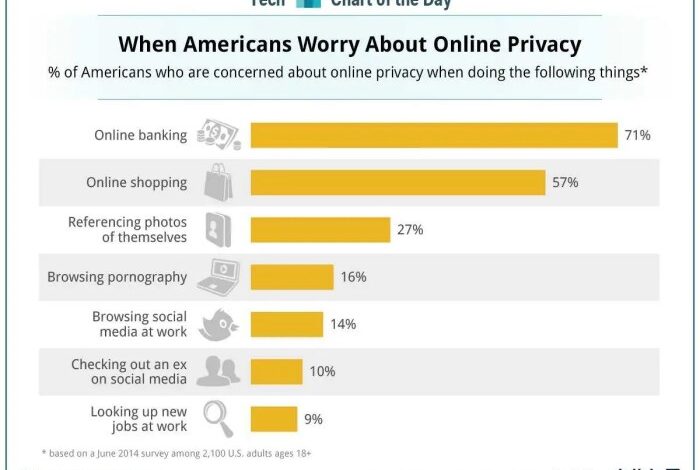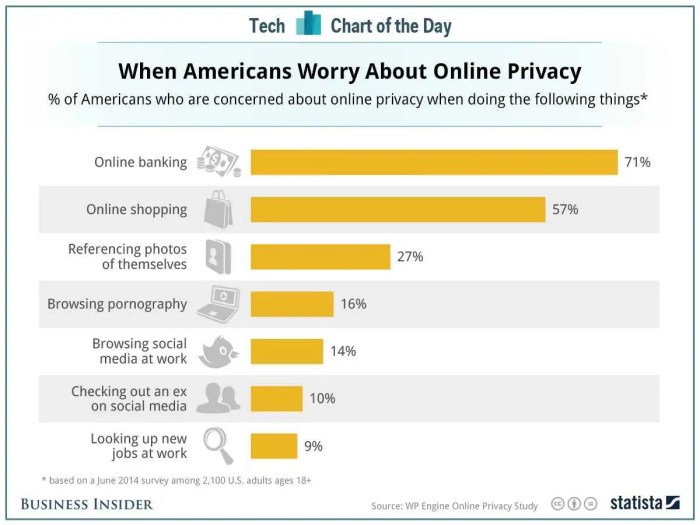
Whose privacy are we protecting? This question isn’t just about technology; it’s about our values, our rights, and our future. From the digital footprints we leave to the physical spaces we inhabit, understanding the different facets of privacy is crucial. We’ll explore the evolution of privacy, the stakeholders involved, the threats to it, the protections in place, and ultimately, the profound implications of our choices.
We’ll delve into the nuances of informational privacy, examining how our data is collected, used, and potentially abused. We’ll also analyze the crucial role of physical privacy in our daily lives, from our homes to our public spaces. Furthermore, we’ll analyze the ethical considerations surrounding privacy, looking at the various stakeholders and their conflicting interests, and the power dynamics at play.
Ultimately, the goal is to provide a comprehensive overview and spark important conversations.
Defining Privacy
Privacy, a concept deeply intertwined with individual autonomy and societal well-being, is multifaceted and constantly evolving. It’s not a static entity, but rather a dynamic interplay between personal desires for control over information and societal needs for order and safety. This exploration delves into the core aspects of privacy, its historical evolution, and the philosophical underpinnings that shape our understanding of this fundamental right.Understanding privacy requires acknowledging its various dimensions, ranging from the control over personal information to the protection of one’s physical space and freedom of decision-making.
The core components of privacy are informational, physical, and decisional, each demanding careful consideration. This exploration will delineate these components and their implications for individuals and society.
Historical Evolution of Privacy Concepts
The concept of privacy has evolved significantly throughout history. Ancient societies often lacked the formal frameworks for protecting privacy that modern societies have developed. As societies became more complex and interconnected, the need for privacy emerged and evolved alongside societal norms. The rise of the printing press and mass media, for example, presented new challenges to privacy, leading to discussions and regulations.
The Industrial Revolution and the subsequent rise of large-scale data collection further emphasized the importance of privacy, creating the need for regulations and legal frameworks to address these concerns. The development of the internet and digital technologies has dramatically reshaped the landscape of privacy, raising novel challenges and prompting renewed debate on the scope and limits of privacy protection.
Different Types of Privacy
Understanding the various types of privacy provides a nuanced perspective on this multifaceted concept. The table below categorizes and explains these types, highlighting their definitions, examples, and implications.
| Type of Privacy | Definition | Examples | Implications |
|---|---|---|---|
| Informational Privacy | The right to control the collection, use, and dissemination of personal information. This encompasses data about individuals’ identities, beliefs, and activities. | Medical records, financial transactions, online browsing history, social media posts. | Protection against misuse of personal data, safeguarding against identity theft, and enabling individuals to make informed decisions about their information. |
| Physical Privacy | The right to control access to one’s physical space and personal environment. This includes the right to be free from unwarranted intrusion and surveillance in private settings. | Home, personal belongings, personal conversations, private communications. | Protection from unwanted observation, harassment, and intrusions, fostering a sense of security and autonomy in personal spaces. |
| Decisional Privacy | The right to make personal choices and decisions without undue interference or coercion. This encompasses the right to freedom of thought, belief, and action. | Choosing a career path, making personal health decisions, participating in political activities, expressing personal beliefs. | Empowering individuals to exercise their autonomy and make choices aligned with their values, fostering personal growth and self-determination. |
Philosophical Underpinnings of Privacy
Various philosophical perspectives offer different justifications for the importance of privacy. Utilitarian theories, for instance, emphasize the societal benefits of privacy, arguing that it fosters individual well-being and contributes to a more harmonious society. Deontological theories, on the other hand, highlight the inherent right to privacy as a fundamental moral principle, regardless of its consequences. Virtue ethics approaches privacy as an aspect of character, focusing on the development of virtues like respect and trustworthiness in interpersonal relationships.
These various philosophical underpinnings contribute to a richer understanding of privacy as a complex and multifaceted concept.
Identifying Stakeholders: Whose Privacy Are We Protecting
Privacy concerns are multifaceted, impacting numerous individuals and organizations in various ways. Understanding the diverse stakeholders involved is crucial to developing effective privacy protection strategies. This intricate web of interests and responsibilities requires careful consideration of power dynamics and potential conflicts to foster a balanced approach.Identifying the key stakeholders involved in privacy decisions allows us to tailor policies and practices to address their unique needs and concerns.
Furthermore, understanding the potential impact of these stakeholders on privacy allows for the development of strategies to mitigate risks and ensure a more robust and equitable approach to data protection.
Stakeholder Interests and Impact
Different stakeholders have varying interests in privacy, which can sometimes clash. Understanding these diverse perspectives is essential to navigating the complex landscape of privacy concerns. Individuals, organizations, governments, and technology companies all have distinct roles and responsibilities in shaping the future of privacy.
Individual Stakeholders
Individuals are the ultimate beneficiaries of privacy protections. Their interest lies in controlling their personal information and preventing misuse. The potential impact of privacy violations on individuals is significant, ranging from reputational damage to financial loss and even emotional distress. For instance, the misuse of personal data can lead to targeted advertising or discrimination in lending practices.
Individuals have a responsibility to be informed about their rights and how their data is being handled, and to utilize available avenues for redress when their privacy is compromised.
Organizational Stakeholders
Organizations, encompassing businesses and institutions, have a vested interest in balancing their operational needs with privacy concerns. Their interests include ensuring compliance with regulations, maintaining customer trust, and avoiding potential legal liabilities. The potential impact of privacy violations on organizations can be substantial, ranging from financial penalties to reputational damage and loss of customer confidence. Their responsibility lies in implementing appropriate data protection measures and providing transparency to their users regarding data handling practices.
Government Stakeholders
Governments play a critical role in establishing and enforcing privacy regulations. Their interests include protecting citizens’ rights, promoting economic growth, and ensuring national security. The potential impact of government policies on privacy can be profound, influencing the way individuals and organizations interact with data. Governments have a responsibility to create and enforce comprehensive privacy laws that strike a balance between protecting individual rights and facilitating legitimate data use.
Technology Companies
Technology companies are responsible for collecting, storing, and processing vast amounts of personal data. Their interests include innovation, efficiency, and profitability. The potential impact of their data handling practices on privacy is immense, influencing the information environment and the daily lives of individuals. Their responsibility is to prioritize data security, implement robust privacy controls, and ensure compliance with regulations and best practices.
Whose privacy are we really protecting when massive brands like Victoria’s Secret are making big moves in the digital sphere? The recent news of Victoria’s Secret bringing flash to AOL, detailed in this fascinating article victorias secret brings flash to aol , raises some interesting questions. Ultimately, it’s a complex issue of balancing business needs with individual data security, isn’t it?
Power Dynamics and Conflicts of Interest
Power dynamics between stakeholders often play a significant role in privacy decisions. For example, technology companies often hold significant power in the data ecosystem due to their control over data collection and processing. This power can lead to conflicts of interest, where the company’s commercial interests might clash with the privacy interests of individuals. These conflicts necessitate careful consideration of regulations and oversight mechanisms to ensure that the interests of all stakeholders are addressed.
Stakeholder Roles and Responsibilities
| Stakeholder | Interests | Potential Impact | Responsibilities |
|---|---|---|---|
| Individuals | Control of personal information, prevention of misuse | Reputational damage, financial loss, emotional distress | Informed consent, utilizing redress mechanisms |
| Organizations | Compliance, customer trust, avoiding liabilities | Financial penalties, reputational damage, loss of customer confidence | Implementing data protection measures, transparency |
| Governments | Protecting citizens’ rights, economic growth, national security | Impacting data interactions, shaping the privacy landscape | Creating and enforcing comprehensive privacy laws |
| Technology Companies | Innovation, efficiency, profitability | Impact on the information environment, influence on daily life | Prioritizing data security, robust privacy controls, compliance |
Analyzing Privacy Threats

Protecting our privacy in the digital age is a multifaceted challenge. The constant exchange of information online, coupled with the ever-evolving nature of technology, creates numerous vulnerabilities. Understanding these threats is crucial to developing effective mitigation strategies.The digital world, while offering unprecedented opportunities, has also exposed us to various risks that jeopardize our personal information. This exploration delves into the multifaceted landscape of privacy threats, examining their manifestations and potential impacts across diverse contexts.
We will also evaluate the effectiveness of current protection methods and consider the implications of emerging technologies.
Data Breaches
Data breaches, characterized by unauthorized access to sensitive information, represent a significant threat to individual privacy. These breaches can expose personal details like financial records, medical histories, and social security numbers. The potential for identity theft, financial fraud, and reputational damage is substantial. For instance, the Equifax data breach in 2017 compromised the personal information of millions of Americans, highlighting the devastating impact that these breaches can have.
We often ponder whose privacy we’re truly safeguarding, especially in the digital age. But consider this: tribune media sends online shoppers to the movies, leveraging data to tailor experiences. This raises a crucial question: are we, as consumers, truly in control of the data used to shape these experiences, or are we just another piece of a larger puzzle?
The blurred lines of privacy in these situations demand our attention.
The sheer scale and speed at which data can be stolen, often facilitated by sophisticated hacking techniques, underscores the urgent need for robust security measures.
Surveillance, Whose privacy are we protecting
Surveillance, whether physical or digital, raises concerns about the extent of privacy infringement. In some cases, it involves constant monitoring of individuals’ activities, often without their knowledge or consent. This can include tracking online behavior, monitoring social media interactions, or even using facial recognition technology. The potential for misuse and abuse is significant. For example, government surveillance programs have sparked considerable debate about the balance between national security and individual rights.
The use of CCTV cameras in public spaces, while intended for security, can also raise privacy concerns.
Misuse of Personal Information
Personal information, collected for legitimate purposes, can be misused for various malicious activities. This includes targeted advertising, unwanted marketing emails, and even the creation of fake profiles. Companies may use personal data to build detailed profiles of individuals, allowing for targeted advertising campaigns. However, the lack of transparency and control over how this data is used often raises privacy concerns.
Examples include targeted online advertisements based on browsing history, and the misuse of data for political manipulation.
Privacy Compromises in Different Contexts
Privacy breaches occur in numerous contexts. In online shopping, the use of credit card details and personal information poses a risk of fraud. Security vulnerabilities in e-commerce platforms can lead to significant financial losses. On social media, the sharing of personal information and interactions can be exploited for identity theft or malicious purposes. In healthcare, patient records are highly sensitive, and breaches can have devastating consequences for individuals’ health and well-being.
Data breaches within medical institutions can lead to the exposure of sensitive patient data, including medical history and diagnoses.
Comparison of Privacy Protection Methods
Various methods exist to protect privacy, each with its own strengths and limitations. Encryption, for instance, protects data from unauthorized access by converting it into an unreadable format. Access controls restrict access to sensitive information to authorized individuals. Data anonymization removes identifying information, making data less vulnerable to breaches. However, the effectiveness of each method depends on the specific context and the nature of the threat.
Impact of Technological Advancements
Technological advancements have both increased and complicated the landscape of privacy. New technologies like artificial intelligence and machine learning can analyze vast amounts of data, potentially leading to better privacy protection measures. However, they also present new challenges, such as the risk of bias in algorithms or the potential for misuse of data in automated decision-making processes. Facial recognition technology, for example, presents both security benefits and significant privacy risks.
Privacy Threats and Mitigation Strategies
| Threat | Description | Mitigation Strategy | Effectiveness |
|---|---|---|---|
| Data Breaches | Unauthorized access to sensitive information. | Stronger encryption, multi-factor authentication, regular security audits. | High, but not foolproof. |
| Surveillance | Constant monitoring of individuals’ activities. | Strong privacy laws, transparency in data collection practices. | Moderate, dependent on enforcement and public awareness. |
| Misuse of Personal Information | Using personal data for malicious activities. | Stricter data governance policies, individual control over data sharing. | High, but requires continuous monitoring. |
Examining Privacy Protections

Protecting personal information in the digital age is crucial. The proliferation of data collection and use necessitates robust legal frameworks and ethical considerations to ensure individual privacy. This section delves into existing legal safeguards, innovative technologies, and the ethical dimensions surrounding privacy protections.Existing laws and regulations attempt to strike a balance between individual privacy rights and the legitimate needs of businesses and governments to collect and utilize data.
Understanding these frameworks, along with the tools and ethical principles that govern their application, is essential for anyone dealing with personal data.
When we talk about whose privacy are we truly protecting, it’s a complex question. Especially as companies like Circuit City, for example, circuit city plugs into e commerce , and leverage data in new ways. The sheer volume of information collected and exchanged in this digital marketplace necessitates a serious re-evaluation of how we define and safeguard personal privacy.
Existing Legal Frameworks and Regulations
Numerous legal frameworks globally aim to regulate the collection, use, and sharing of personal data. These regulations vary in scope and implementation but share a common goal: to protect individuals’ privacy rights. The General Data Protection Regulation (GDPR) in Europe and the California Consumer Privacy Act (CCPA) in the US are prominent examples. These regulations establish specific rights for individuals, such as the right to access, rectify, and delete their personal data.
Privacy-Enhancing Technologies (PETs)
Privacy-enhancing technologies are innovative tools designed to protect personal data without sacrificing functionality. These technologies often rely on cryptography and other secure techniques to anonymize or encrypt data, reducing the risk of unauthorized access and use.Examples of PETs include differential privacy, federated learning, and homomorphic encryption. Differential privacy adds noise to data, making it harder to identify individuals, while federated learning allows multiple parties to collaborate on machine learning models without sharing raw data.
Homomorphic encryption enables computations on encrypted data, preserving privacy during processing.
Ethical Considerations Regarding Privacy Protections
Ethical considerations play a vital role in the design and implementation of privacy protections. Considerations such as data minimization, purpose limitation, and data security are crucial for responsible data handling. Transparency and informed consent are also key aspects to ensure individuals understand how their data is being used.
Transparency and Accountability in Safeguarding Privacy
Transparency in data practices is essential for building trust. Individuals should have clear and easily accessible information about how their data is collected, used, and shared. Accountability mechanisms, such as data protection officers and independent oversight bodies, are crucial for ensuring compliance with privacy regulations.
Summary Table of Privacy Laws and Regulations
| Privacy Law/Regulation | Key Provisions | Applicability | Enforcement Mechanisms |
|---|---|---|---|
| GDPR (General Data Protection Regulation) | Establishes strong individual rights, including rights to access, rectification, and erasure of personal data; focus on data minimization, purpose limitation, and data security. | Applies to organizations processing personal data of EU residents, regardless of the location of the controller. | Enforcement by national data protection authorities. |
| CCPA (California Consumer Privacy Act) | Grants California residents specific rights regarding their personal data, including the right to know, delete, and opt-out of the sale of their personal information. | Applies to businesses collecting, selling, or sharing the personal information of California residents. | Enforcement by the California Attorney General. |
| Other Relevant Laws | Various national and regional laws and regulations across the globe. | Specific to jurisdiction. | Specific to jurisdiction. |
Evaluating Privacy Implications
Privacy is more than just a digital concept; it’s a cornerstone of a functioning society. Understanding its implications – social, economic, and political – is crucial for developing sound policies and responsible practices. We must carefully weigh the benefits of privacy against other important values and recognize the potential damage of privacy violations. This section delves into the multifaceted nature of privacy implications, exploring the interplay between individual rights, societal well-being, and technological advancements.The evaluation of privacy implications necessitates a comprehensive understanding of its impact across various spheres of life.
This includes recognizing the complex trade-offs between privacy and other values, the potential consequences of violations, and the vital role privacy plays in fostering trust and social cohesion. Failure to adequately address these implications can lead to unforeseen and potentially harmful outcomes for individuals and society.
Social Implications of Privacy Decisions
Privacy deeply influences social interactions and relationships. Respect for privacy fosters trust and enables individuals to freely express themselves without fear of judgment or reprisal. This freedom of expression is vital for the development of diverse viewpoints and the advancement of social progress. Conversely, a lack of privacy can breed suspicion, hinder open communication, and potentially lead to social divisions.
For example, the rise of social media has created both opportunities for connection and challenges to privacy. The constant exposure of personal lives can contribute to social comparisons and anxieties, impacting mental well-being.
Economic Implications of Privacy Decisions
Privacy considerations have significant economic ramifications. Businesses operating in data-intensive sectors must consider how their data collection practices impact consumers’ trust and confidence. The ability to protect sensitive information is critical for maintaining customer loyalty and fostering economic growth. For example, companies that prioritize user privacy often enjoy increased brand reputation and customer engagement. Conversely, breaches of trust related to privacy issues can lead to substantial financial losses and damage a company’s reputation.
“Data privacy is not just a social issue; it’s an economic issue as well. Companies that prioritize customer privacy often experience increased customer loyalty and brand reputation, leading to greater profitability and market share.”
Political Implications of Privacy Decisions
Privacy rights are deeply intertwined with political systems and processes. Protecting individuals’ privacy is often considered a fundamental human right, and governments play a crucial role in establishing and enforcing policies that safeguard this right. Balancing privacy concerns with other important political considerations, such as national security or public safety, can be a complex task. The potential for misuse of personal data by political actors or government agencies raises serious concerns about the exercise of power and accountability.
Trade-offs Between Privacy and Other Values
Balancing privacy with other societal values is a crucial aspect of evaluating privacy implications. The tension between privacy and security is a common example. Measures to enhance security, such as surveillance technologies, can potentially infringe on individual privacy. A similar tension exists between privacy and convenience, as technologies that offer convenience often require the collection and analysis of personal data.
Finding a balance between these competing values is essential for developing sustainable and ethical solutions.
Impact of Privacy Violations on Individuals and Society
Privacy violations can have a profound impact on individuals and society. Breaches of personal data can result in identity theft, financial fraud, and emotional distress. Furthermore, the erosion of trust in institutions and individuals can have far-reaching social consequences. The loss of privacy can also negatively impact economic growth, as consumers may be hesitant to engage in transactions or share information with businesses that don’t prioritize their privacy.
Examples of such impacts can be seen in cases where individuals have been subjected to targeted advertising or surveillance.
Privacy’s Role in Fostering Trust and Social Cohesion
Privacy is fundamental to building trust and social cohesion. When individuals feel secure in their privacy, they are more likely to engage in social interactions, participate in civic life, and contribute to their communities. A culture of respect for privacy creates an environment where individuals feel valued and respected. This can lead to greater social cohesion and a more harmonious society.
Consequences of Neglecting Privacy
Neglecting privacy can have far-reaching and potentially devastating consequences for individuals and society. This can include the erosion of democratic principles, the rise of social divisions, and the potential for abuse of power. Furthermore, neglecting privacy can result in financial losses for businesses and undermine economic growth. The potential for misuse of personal data by malicious actors or government agencies further highlights the importance of safeguarding privacy.
Last Point
In conclusion, understanding whose privacy we’re protecting is more than just a theoretical exercise; it’s a practical necessity in our increasingly interconnected world. We’ve explored the complexities of privacy from its historical roots to its present-day implications. The intricate web of stakeholders, the ever-evolving threats, and the available protections all contribute to a dynamic landscape. Ultimately, the question of whose privacy is at stake demands ongoing dialogue, critical analysis, and a commitment to ethical considerations.






